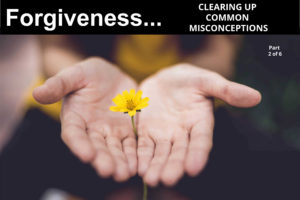Forgiveness… Clearing Up the Misconceptions – part 2 of 6

To get started, let’s first look at what forgiveness is not. It is not uncommon that I go through this list with someone and they tell me that they realize one or two of these things were standing in the way of forgiveness. Hopefully, understanding what forgiveness is not will open us up to the healing and wholeness that comes with forgiveness.
Here are five misconceptions about what forgiveness isn’t. Understanding this may free us to forgive.
1. Forgiveness is not a feeling.
If you are waiting until the feeling to forgive comes upon you, it is unlikely to occur. Forgiveness is an act of obedience to God, stemming from gratitude for His grace. And God knows that revenge, anger and rage can destroy us spiritually, emotionally and physically. Christ paid too much for His beloved ones to be slaves to anything, particularly hatred. He wants His children free. And a person is never free when weighed down by bitterness. When the cold shackles of revenge are tightly clasped around our wrists, it is impossible to lift our hands in praise to Him.
2. Forgiveness is not pretending you were not hurt.
Walking around with a painted-on smile when you are seething inside is not forgiveness. In scripture we never see Jesus pretend. When he was sad, he cried (John 11:35). When he was angry, he turned over the tables in the Temple (John 2:15-16). Someone has betrayed your trust, damaged your soul or caused a loss. It is OK to recognize and feel the hurt instigated by another’s behavior.
3. Forgiveness is not condoning what the person did to you.
Many people hesitate to forgive because they feel as though the wrongdoer is getting away with the offense or that forgiveness will somehow condone the offender’s choices. It doesn’t. Instead, forgiving releases the wrongdoer from the debt they owe you and releases you from the bitterness.
4. Forgiveness is not trusting the offender.
After a betrayal, trust is not an automatic right of the offender. Forgiveness does not mean you immediately allow the person back into your life or heart. If someone is repentant and willing to work on restoring the relationship, you might be able to trust them again eventually. However, sometimes those who wound us shouldn’t be trusted again.
Though forgiveness should not be contingent on the perpetrator’s repentance, a truly repentant person doesn’t demand forgiveness or misuse Bible verses in an attempt to make you feel guilty. They humbly accept complete responsibility for their sin and the consequences of their actions (Psalm 51), which may include giving you time to see evidence of their trustworthiness.
There are people in my life whom I have forgiven, but I no longer trust, because they have chosen to continue the same negative patterns that caused the offense or hurt in the first place.
5. Forgiveness is not relieving the person of responsibility.
A person shouldn’t be off the hook from his or her responsibilities just because you choose to forgive. For example, a wife may be forgiven for placing the family in financial ruin with debt, but she should still be responsible for paying off the debt. A former husband may be forgiven for destroying his marriage with an affair, but he should still pay child support to his former wife.
Forgiveness doesn’t eradicate responsibility. It is not unloving to hold someone accountable. Often accountability is the most loving thing you can do because it could lead to repentance.
Releasing resentment against one who has offended or hurt you, is rarely a one-time event. The pain doesn’t necessarily disappear once you forgive someone. And those closest to us may hurt us repeatedly, requiring us to forgive multiple times.
The best way to step toward forgiveness is to admit that you need to forgive. Be honest with the Lord and ask Him to reveal any distorted thinking you may have about forgiveness. That often begins with discovering the difference between what forgiveness is, and what it is not. It is not uncommon for someone to examine these five misbeliefs and come to realize that they hadn’t understood forgiveness and that they can forgive or begin the process to forgive.
Click here for part 3 in this series on forgiveness.




